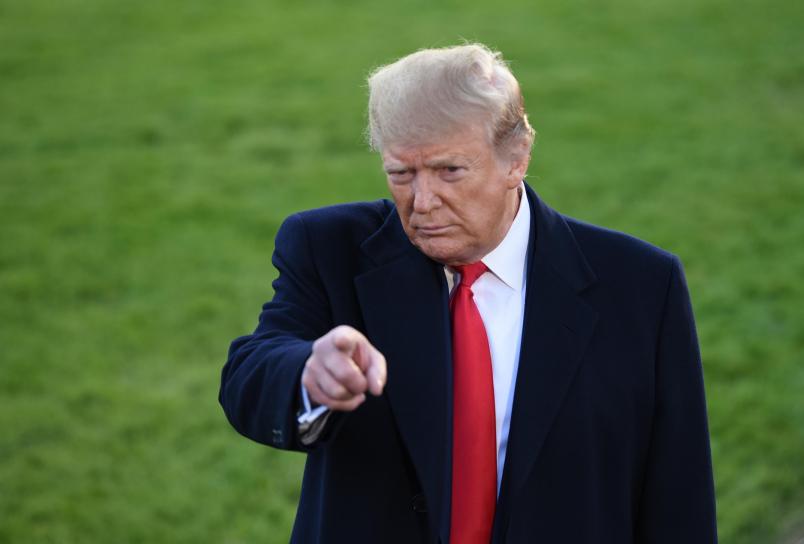What good could come of exposing the identity of the Ukraine call whistleblower, whose anonymity is a foundational protection under American law?
That’s a good question for at least three key Republicans, who have leveraged their influence as prominent, senior lawmakers to embark on what is widely considered a fool’s errand at this stage in the impeachment game: attempting to out the whistleblower, whose momentous complaint shed sunlight on the foreign pressure campaign that’s formed the basis of the House impeachment inquiry.
In just the past 24 hours, President Trump has garnered some serious support in his endeavor to unmask the whistleblower. During a rally in Kentucky on Monday evening, Sen. Rand Paul (R-KY) stood jubilantly by Trump’s side as he ticked off the fabricated allegations against the Biden family before declaring to a crowd of cheering Trump fans that the media should do their job and “print” the name of the whistleblower.
Prominent Trump ally Sen. Lindsey Graham quickly patted Paul on the back for the befuddling assertion, arguing that a whistleblower protections were never meant to equate “anonymity.”
“It was meant to allow you to come forward without being fired. You can’t use anonymity in a criminal process; you can’t use anonymity in a civil process and you shouldn’t be able to,” he said Tuesday, according to CNN. “This is a misuse of the statute. We need to know who this person is because without the complaint, there would be no impeachment inquiry.”
House Oversight Committee member Mark Meadows expressed a similar sentiment on Tuesday, saying it would be “helpful” to know the whistleblower’s identity so as to understand the person’s motivations. House Oversight ranking member Jim Jordan (R-OH) said the same, raising the importance of identity in determining the credibility of the initial complaint.
While he’s gained increased support in this arena, Trump remains the biggest offender when it comes to attempting to out the individual who first outed the Ukraine scheme. Trump has been tweeting for weeks, urging that the whistleblower’s identity to be revealed. The President even went as far as to yearn for a time when the whistleblower’s source, whom he considers a spy, could be executed.
In media and political circles, there are at least five names of being floated as the possible identity of the whistleblower. The New York Times revealed the whistleblower’s gender last month. And several Republicans — like Sens. Joni Ernst (R-IA) and Paul — have boasted they know the whistleblower has already been “outed.”
The drip-drip of data points on the identity of the character who ignited the historic impeachment probe has become a matter of increasing concern for the whistleblower’s lawyers — who told Reuters such behaviors was the “pinnacle of irresponsibility and is intentionally reckless” — especially in the current state of investigations, where his identity and subsequently his allegations are essentially irrelevant.
Democrats have argued for weeks that they don’t plan to call the whistleblower in to be deposed because his complaints have already been corroborated by several key impeachment sources. Several Republicans — Sens. Chuck Grassley (R-IA), Mitt Romney (R-UT), Lamar Alexander (R-TN), John Thune (R-SD), to name a few — joined in efforts to keep the identity of the whistleblower secret.
Others like Sens. Roy Blunt (R-MO) and Richard Burr (R-NC) took a more middle ground approach, insisting the person’s identity should remain anonymous, but that the whistleblower should be forced to answer questions. (For what it’s worth, the whistleblower’s lawyers have already offered lawmakers the opportunity to submit written questions for the individual to answer anonymously).
And while not all Republicans are gunning to expose the whistleblower, a few key Republicans on the committees pursuing the impeachment probe seem determined to buck precedent and reveal what, if any, political affiliations the whistleblower might hold. Just last week, House Intelligence Committee Chair Adam Schiff (D-CA) cut off Republicans in their questioning of Army Lt. Col. Alexander Vindman when it became apparent their line of questioning was designed to reveal the identity of the whistleblower.
But the endeavor seems to be a immaterial at this stage in the game. The House has interviewed and released the transcript of depositions from enough on-the-record White House and Trump administration officials to corroborate each weighty detail of the whistleblower complaint, including revelations on Tuesday that key State Department witness Gordon Sondland confirmed there was quid pro quo associated with the withheld military aid to Ukraine.



